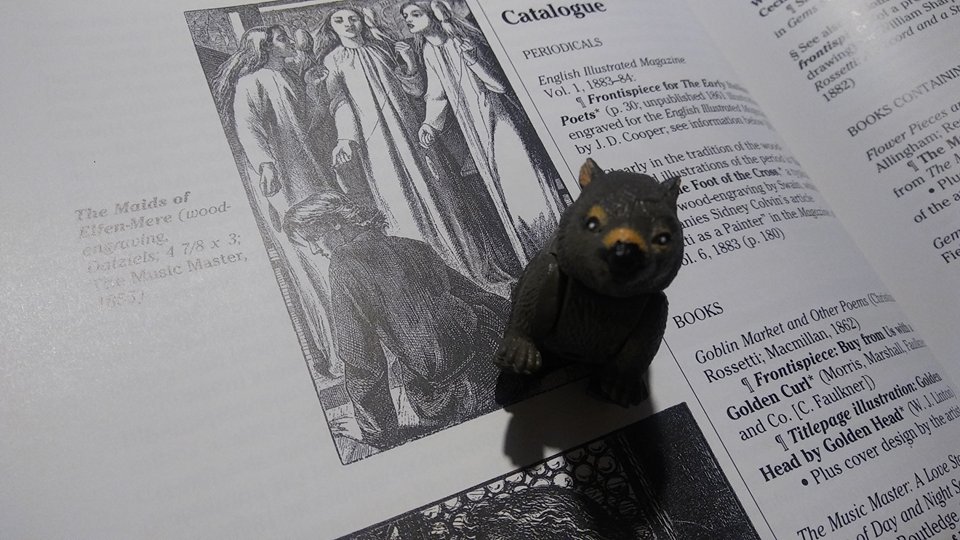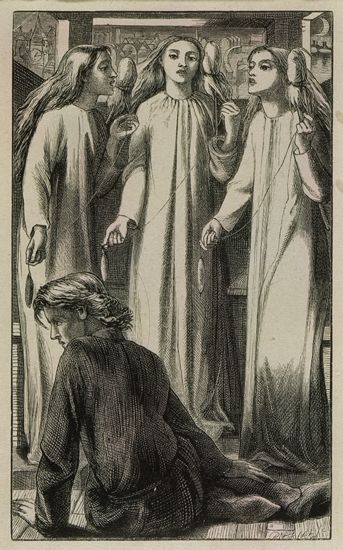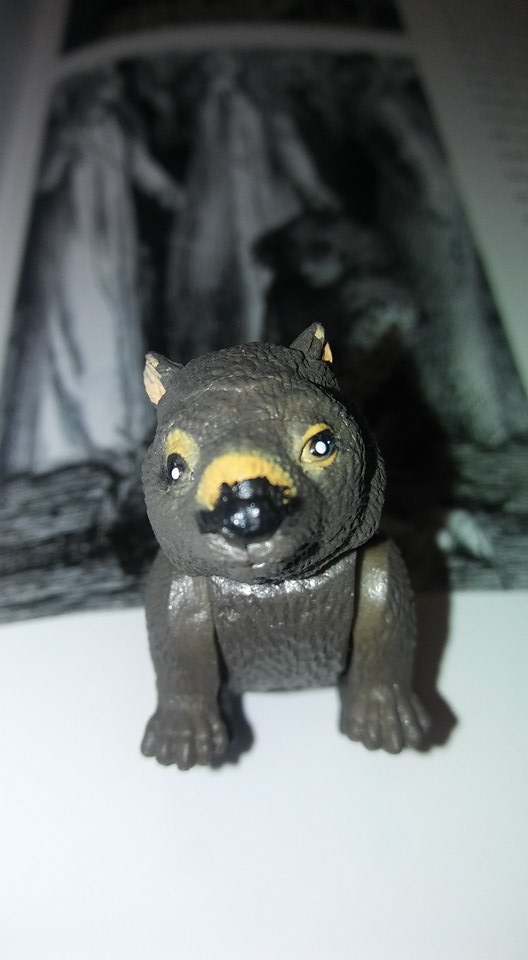Inspired by artist Dante Gabriel Rossetti’s passion for wombats, every Friday is Wombat Friday at Pre-Raphaelite Sisterhood. “The Wombat is a Joy, a Triumph, a Delight, a Madness!” – Dante Gabriel Rossetti
Like Rossetti, Thaddeus Fern Diogenes Wombat has a passion for supernatural tales. Today I thought I’d introduce him to three enchanting ladies who came to a tragic end.
Dante Gabriel Rossetti’s first published illustration was The Maids of Elfen-Mere, drawn to illustrate a ballad by William Allingham titled “The Maids of Elphin-Mere”. The Rossetti Archive includes it in their collection note: “DGR’s illustration was made for Allingham’s ballad “The Maids of Elfin-Mere”, which was published in The Music Master, A Love Story, and Two Series of Day and Night Songs (1855) volume. It should be noted, however, that DGR employed a variant spelling–Maids of Elfen-Mere–for his design.” You may be interested in reading about Allingham’s diaries, a treasure trove of information that includes many 19th century authors.

Dante Gabriel Rossetti by Julian Treuherz, Elizabeth Prettejohn, and Edwin Baker describes the problem that DGR had with this illustration saying that “This was Rossetti’s first published illustration, and he had a great deal of trouble with it, first failing to reverse it for the wood-block, and then complaining that the Dalziel brothers, who were responsible for the design on the wood, had ruined it in the process. Nevertheless, the engraving was highly praised. Burne-Jones considered it ‘the most beautiful drawing for an illustration I have ever seen’ “
The Maids of Elfin-Mere is a supernatural ballad, telling the tale of the nightly apparition of three ladies clad in white. They sing songs while they spin until eleven o’clock, the time when their apparition comes to an end and they disappear (Spinning to a pulsing cadence, Singing songs of Elfin-Mere; Till the eleventh hour was toll’d). They were loved by all, especially a Pastor’s son who develops a passion for them. (Most of all, the Pastor’s Son, Listening to their gentle singing, Felt his heart go from him, clinging Round these Maids of Elfin-Mere.)
The brief nightly visits were not enough for him, so he changed the time on the village clock on what would become their last visit. The Maids never returned and the only remnant of them was three bloodstains left in the lake (Saw at dawn three stains of gore In the waters fade and dwindle). The Pastor’s Son died filled with regret.

In the faces of the maids, we can see Elizabeth Siddal’s features; it was drawn by Rossetti in the mid 1850’s, a time when Lizzie’s image permeated his works. She too would die one night, never to return and left Rossetti to pine and regret and live with a guilt that would never leave. Once again we are left to note how often Rossetti’s life imitated his art in a sad and tragic way.
The Maids of Elfin-Mere by William Allingham
When the spinning-room was here
Came Three Damsels, clothed in white,
With their spindles every night;
One and Two and three fair Maidens,
Spinning to a pulsing cadence,
Singing songs of Elfin-Mere;
Till the eleventh hour was toll’d,
Then departed through the wold.
Years ago, and years ago;
And the tall reeds sigh as the wind doth blow.
Three white Lilies, calm and clear,
And they were loved by every one;
Most of all, the Pastor’s Son,
Listening to their gentle singing,
Felt his heart go from him, clinging
Round these Maids of Elfin-Mere.
Sued each night to make them stay,
Sadden’d when they went away.
Years ago, and years ago;
And the tall reeds sigh as the wind doth blow.
Hands that shook with love and fear
Dared put back the village clock,—
Flew the spindle, turn’d the rock,
Flow’d the song with subtle rounding,
Till the false ‘eleven’ was sounding;
Then these Maids of Elfin-Mere
Swiftly, softly, left the room,
Like three doves on snowy plume.
Years ago, and years ago;
And the tall reeds sigh as the wind doth blow.
One that night who wander’d near
Heard lamentings by the shore,
Saw at dawn three stains of gore
In the waters fade and dwindle.
Never more with song and spindle
Saw we Maids of Elfin-Mere,
The Pastor’s Son did pine and die;
Because true love should never lie.
Years ago, and years ago;
And the tall reeds sigh as the wind doth blow.
Tori Amos drew inspiration from Allingham’s ballad in her song Maids of Elfen-Mere.

